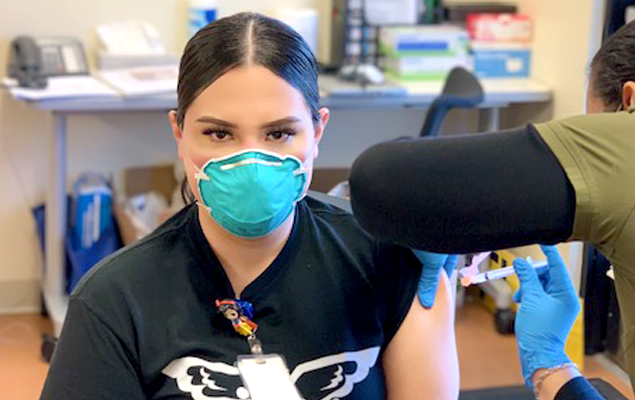
As communities prepare for the COVID vaccines to be widely available, residents are expressing their interest or aversion to receiving them. With mild, and sometimes severe reactions being reported, people are seriously considering both the risks and benefits. Public opinion by Latinos and other racial groups show interesting contrasts related to the vaccines that are now being administered.
Also, in response to the adverse reactions, the CDC has updated (below) its vaccine guidance.
Separate from availability of the vaccines is the range of people’s beliefs about the vaccines and their personal desire to receive it. According to Pew Research, sixty percent of Latinos said they would be willing to take the vaccine, but another poll from the Kaiser Family Foundation said only 26 percent would take it as soon as possible.
Invisibly Realtime Research recently surveyed 5,537 Americans to understand attitudes toward the Covid-19 vaccine, and learned that Americans are split on their willingness to take the vaccine. Attitudes towards the vaccine are also different among different ethnic groups and ages. Here’s what Invisibly learned:
• 47% of people are unlikely to get the Covid-19 vaccine
o 50% of Latino people are unlikely to get the vaccine
o 53% of Black people are unlikely to get the vaccine
o 48% of Other ethnicities are unlikely to get the vaccine
o 38% of White people are unlikely to get the vaccine
• 44% of Americans feel the vaccines are untrustworthy
• 25% of vaccinated individuals said they are unlikely to wear a mask after vaccination
Locally, La Clínica de La Raza in Oakland responded to my questions regarding the vaccines. La Clínica recently vaccinated the majority of their staff, though, “some are requesting additional time to think about getting it,” said La Clínica Chief Medical Officer Paul Bayard, MD. At the time of our interview, La Clínica was not providing COVID vaccines to the general public.
Asking if people who had COVID in the past need to be vaccinated, Dr. Bayard said, “Yes, people who have had COVID need to be vaccinated. If they currently have it, wait until their isolation period is done, then get it. The reason is that we don't know how long immunity lasts from getting COVID, and we have seen cases of reinfection.”
Health care workers and other front-line workers are the first groups to decide to accept the vaccine. About fifty percent of front-line workers in California’s Riverside County have refused to take the vaccine, Riverside Public Health Director Kim Saruwatari told the LA Times.
A survey by the National Association of Health Care Assistants revealed that 72 percent of certified nursing assistants plan to refuse the vaccine, as are 55 percent of firefighters in New York, according to a December 2020 poll by the Uniformed Firefighters Association.
According to data from the Pew Research Center, 62 percent of Americans report they would be uncomfortable being among the first people to receive the vaccine. Approximately two-thirds of those who say they would “probably” be vaccinated are not comfortable being among the first people to receive it.
On a personal level, people are clearly questioning the effectiveness of the vaccine, as well as the risks.
In a recent article, Madhava Setty, MD, wrote, “The 95 percent efficacy of the Pfizer vaccine is widely touted by the media and the medical establishment, but there are important questions to be asked about this claim. Are we being given all information available from COVID vaccine studies to make informed decisions? Are the studies even being done in a way that represents what effects the vaccine may have on the whole population?”
Setty continues: “I would suggest that those in the “vaccine cautionary” community would decline the vaccine based on their ideas around its potential risks. On the other hand, supporters of the vaccine are more likely to focus on its potential benefits. The debate has largely been centered around the disagreement people have about the risks.”
The CDC has updated its vaccine guidance in response to reports of reactions to the vaccines, stating that:
“If you have had an immediate allergic reaction—even if it was not severe—to any ingredient in an mRNA COVID-19 vaccine, CDC recommends that you should not get either of the currently available mRNA COVID-19 vaccines. If you had an immediate allergic reaction after getting the first dose of an mRNA COVID-19 vaccine, you should not get the second dose.”
CDC has also learned of reports that some people have experienced non-severe allergic reactions within four hours of getting vaccinated, such as hives, swelling, and wheezing (respiratory distress).
Vaccine administration began in Alameda County the week of December 14, 2020. Alameda County is following Federal and State recommendations. Vaccines are being administered in phases, and the available supply of vaccines affects how quickly each phase can be completed. Currently, Alameda County is vaccinating Phase 1a: Health Care Workers, which include:
Tier 1: Hospitals, Dialysis, EMTs, Long-Term Care Facilities/Skilled Nursing
Tier 2: Community Health Workers, IHSS/Home Health Care, Primary care, behavioral health, & specialty providers
Tier 3: Dentists, Blood Banks, Pharmacy Staff
Depending on where you live in California, COVID-19 vaccines are currently also available only for:
• Individuals 65 and older
• Education and childcare
• Emergency services
• Food and agriculture

